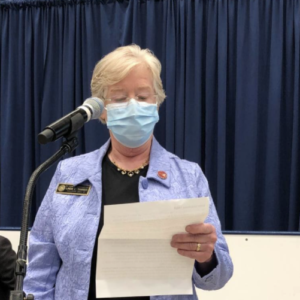By Shirley Svorny
New Hampshire legislators are considering a bill that would allow school districts to hire school nurses with an Associate’s Degree, replacing the existing requirement that school nurses have earned a Bachelor of Science in Nursing (BSN). This makes all the sense in the world. Expect incumbent nurses, who gain the most from the current regulation — as it restricts entry and competition — to push back against the change. They will argue such a change would put the entire school population at risk.
If we want to encourage innovations in the provision of health care to increase access to care and, even, potentially lower the cost, we can’t keep listening to the health workforce lobbyists. They don’t have our interests at heart. The physician’s lobby has worked to preclude an efficient workforce configuration for decades. Efforts in NH to protect the regulatory constraints on hiring school nurses fall into this category.
Legislators rely on professional input because, generally, they are unaware of the negative impact regulatory intervention can have on healthcare.
For example, Rep. Linda Tanner (D-Georges Mill) testified she was “very distressed by the bill.” “I don’t know about you, but when I’m in the hospital and a nurse walks in the room I don’t want just some ‘Jeannie Smith off the sidewalk’ that’s maybe taken two years at a community college with basic education and I have something that’s very technical.”
Tanner shows her complete ignorance of nursing with this statement.
When hiring nurses, employers value experience, not degrees. The nursing establishment has tried to intervene to push for the BSN by establishing a Magnet designation that hospitals can use to toot their own horn. Elite hospitals that seek the Magnet designation are required to hire nurses with a BSN degree, on the pretense that it improves care.
However, the empirical literature on the impact of BSN nurses on patient outcomes is rife with problems. Hospitals with 80% BSN nurses are not like those with 10% BSN nurses. If outcomes are different, it is likely to be related to (empirically uncontrolled) attributes of a hospital or the community which then lead to differences in patient outcomes, not the BSN nurses themselves.
Legislators presented with the empirical findings that hospitals with BSN nurses have better patient outcomes, published by reputable journals, including JAMA, will buy into the BSN argument. No one points out the errors in the empirical work. Don’t expect nurses to point it out — it is in their self-interest to restrict entry (competition). Funded by the Robert Wood Johnson Foundation, nurse-run organizations continue to push for the BSN as the standard degree for entry into the profession. This degree plays a limited role in preparing clinicians to provide a variety of specialty services. Nurses learn on the job; it’s experience that matters.
I’m sure, after this statement, Tanner will learn the extent to which associate degree RNs provide “technical” services in nursing — administering chemotherapy to oncology patients or inserting peripherally inserted central catheters (PICC lines), for example. Practice specialties have associated credentials that nurses (RN or BSN/RN) earn to demonstrate their specialty-specific knowledge and skills.
While I have your attention, let me suggest NH legislators investigate a telehealth system. It would make more sense to put money into a telehealth system connecting the schools than in requiring a BSN, which makes school nurses more expensive.
Shirley Svorny, Ph.D. is a Professor of Economics Emeritus at California State University and an Adjunct Scholar at Cato Institute
**** Send your news tips, Op-Eds, and Letters to the Editor to NewsNHJ@insidesources.com! ****




